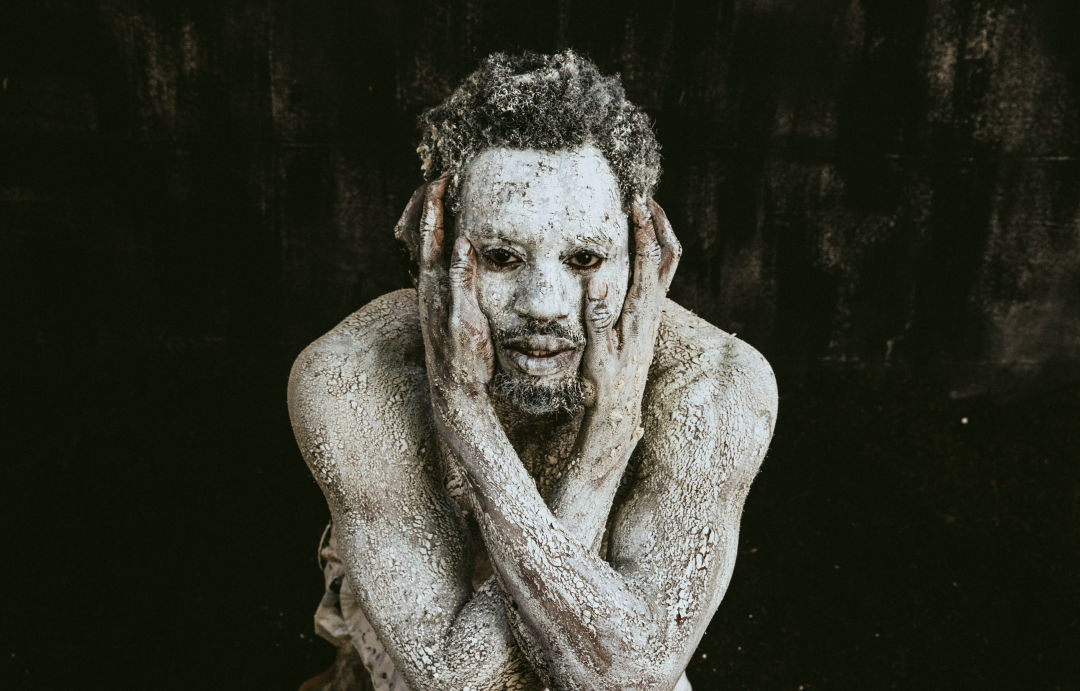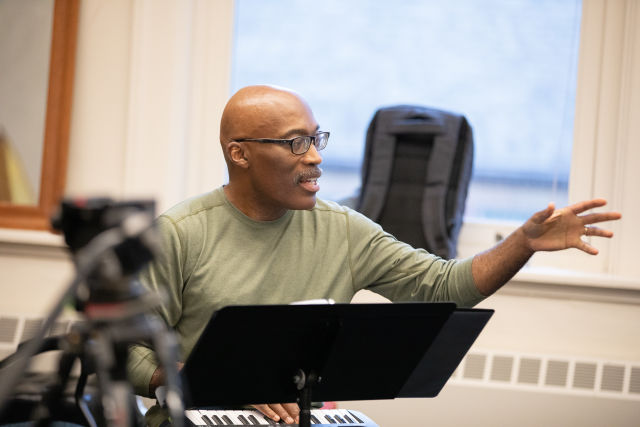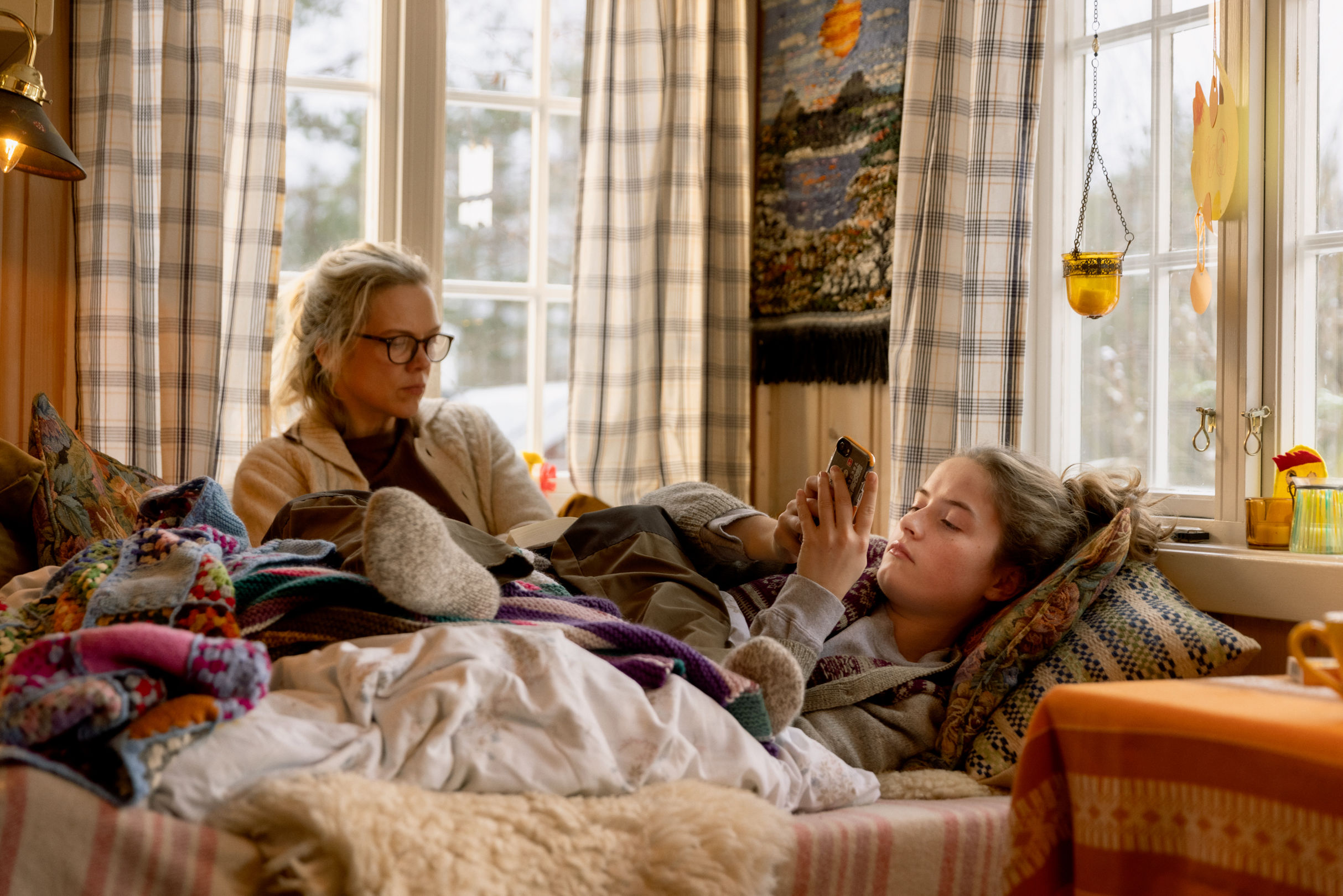16 Months Later, Darrell Grant’s Jazz Opera on Gentrification Hits the Stage

Derion Loman as White the Dancer in Sanctuaries
Image: Jade Mainad
D
arrell Grant has a confession to make: he really likes that American Express commercial with Lin-Manuel Miranda in it. The one where Miranda, in a zip-up hoodie, bops around New York and dispenses little nuggets of wisdom over a twinkling piano.
“It’s actually kind of trite,” Grant admits, “but [Miranda] says, ‘Never be satisfied with your first draft. Never be satisfied with your 10th draft.’ And I was like, ‘Oh, OK. Great.’”
Grat's latest project, it's reasonable to assume, has long surpassed 10 drafts. Sanctuaries, a jazz opera that reckons with the gentrification of Portland's historically Black neighborhoods, will hit the pavilion outside the Memorial Coliseum next week, with nightly performances from September 7–9. It was set to premiere in April last year, before COVID axed the arts; by then, it was already four years in the making.
Grant—one of Portland's most beloved and prolific composers—first approached Third Angle New Music about collaborating on a gentrification-focused project in 2016. He'd just completed a suite about Oregon's geographic history called The Territory and the subject was on his mind, particularly as it pertained to the transformation of North and Northeast Portland. "It's such a large story that it seemed like opera was really the medium, even though, at the time, I had no intention or thought of writing an opera," Grant says. So he asked himself why. Opera, he felt, wasn't necessarily a space that welcomed Black artists; being a jazz composer, he'd certainly never strayed into its waters.
But then he tapped into what he calls "a new flowering" of opera by Black composers: next month, the Met will premiere Terence Blanchard's Fire Shut Up in My Bones, its first-ever opera by a Black composer; in 2017, violinist Daniel Bernard Roumain's opera We Shall Not Be Moved, which traces the history of the 1985 police bombings in Philadelphia, premiered at the Apollo. Once Grant realized there was "a place in [that] music for authorship," he says, the question became, "What is my voice in this, and how do I apply that to this story, with my particular, unique, musical background?"

Grant leading a rehearsal for Sanctuaries
Image: Intisar Abioto
Luckily, he had a little bit of time. Opera, he chuckles, is expensive—an enormous theatrical production, essentially, with a larger orchestra than your average musical. Third Angle spent most of 2017 creating budgets and finding funding for the project. In 2018, Grant took a sabbatical from his work teaching music at Portland State University to immerse himself in chamber music, internalize the histories of North and Northeast Portland, and most importantly, sit down and write. "It was a good six months of writing every day, most of the day," he says. "I imagine there are people that write faster, but I had the luxury of all this time."
During all that time, he also assembled a dizzying team of collaborators. "My book How to Write an Opera said you need a librettist," he jokes, so Grant reached out to Oregon's poet laureate Anis Mojgani (in his pre-laureate days), as a fan of his performance-minded work. "He was skeptical, to say the least," Grant says, but their shared curiosity and outsider-to-opera status convinced him. While seeking a director, Grant called an old friend, who was regrettably all booked up; instead, he suggested his nephew, who just happened to be Alexander Gedeon, a rising opera star with hands in a slew of groundbreaking projects up and down the West Coast.
While the budding team worked, Vanport Mosaic held storytelling events about the histories of North and Northeast Portland that helped inform the opera's shape. Grant dipped into his jazz connections to bring local powerhouses like Damien Geter and Marilyn Keller onboard. Third Angle selected a warehouse in North Portland to host an April 2020 premiere for what artistic director Sarah Tiedemann describes as "the biggest project in [the company's] history." And then, so the stories all go, came the pandemic.
"We were just coming off a really beautiful show with Caroline Shaw, and we were on cloud nine," Tiedemann says. "It really did feel like somebody had pulled the rug out from under us." They called the show off shortly after the governor's late-March stay-at-home order, and joined the rest of us in fretting about our sudden, brutal upheaval.
Then came the summer. The racial justice protests following the murder of George Floyd, and Portland's centrality in them, set a new stage for Sanctuaries. "In a way, I feel like to have had the opportunity to process all of that, and have the opera now, is even more powerful and more significant," Grant says, careful not to center Sanctuaries too much. "We were all stunned. The world was falling apart. This didn't seem like the biggest or worst thing that was happening at the time."
Given extra time to tinker, Grant took it, though he says most changes were cosmetic and compositional, and the core concerns of Sanctuaries weren't affected by 2020's rapidly shifting social climate. The tinkering, though, did lead him to produce an interim piece for Third Angle's 2020 soundwalk series, which detailed the history of Black churches in Portland's Alberta and Albina districts.
By the time it became clear, in 2021, that the company might be able to perform Sanctuaries after all, Tiedemann already had her eyes on the Memorial Coliseum, which, like Manhattan's Central Park, was built on the site of a demolished Black neighborhood. "It's the nexus of the destruction that's happened in that neighborhood," she says. "So it's pretty striking to be able to sit outdoors in that space, watching the opera, and then turn and look over your shoulder, and imagine what would have been there before."
After five years of work, how does it feel to finally expose Sanctuaries to the light? "I've been writing an opera for five years," Grant says, "so I don't know what it will be like, in two weeks, when I say I wrote an opera." For starters, he says, it helps to hearken back to that Miranda quote: this is not its final form. "To me, art is about this connection: How does it impact the world? How do people experience it? ... There is work that this piece is meant to do in the world, and it can't do it until people experience it."
And what is that work? "Well," Grant says, taking an enormously pregnant pause. "We have to figure out how to live together. I'm not trying to be grandiose or anything, but I do feel like art has a big role to play in helping people imagine a new world. While I was researching this piece, I was talking to urban planners, because I was like, 'I get it, gentrification. This is what happened. But what do we do instead? If not this, what?' I feel like this opera is a way of posing that question. I could ask everyone I know, but writing a piece that gets people to think in that way, that's at least part of what the work is."
To underline the point, he highlights the piece's composition: a marriage of jazz and European chamber music.
"I wrote a line for the violinist, and it's doubled by the jazz saxophonist. It's the same note, but I have to write them completely differently for the people who come from those two traditions, in order to get them to play them in the same way," Grant says. "The same things, seen through these different lenses, look so different, though they're essentially the same. How does that come together? The spontaneity and improvisational nature of jazz, with the thoughtful, intentional, exacting tradition of Western European music? How do those live together? And in the way that those live together is the way that we, who come from those cultures, get to live together."
Pardon us, Lin and Amex; our money is on Sanctuaries being the richer text.
Sanctuaries
8:30 p.m. Tue–Thu, Sept 7–9, Veterans Memorial Coliseum Pavilion, $10–35




